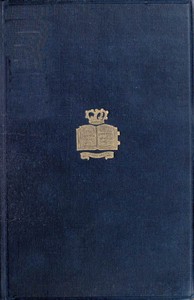The Purpose of History by Frederick James Eugene Woodbridge
"The Purpose of History" by Frederick James Eugene Woodbridge is a philosophical treatise composed of three lectures delivered at the University of North Carolina, written in the early 20th century. The work explores the significance and implications of history, discussing how historical studies reflect the maturity of human thought and the philosophical inquiries they inspire regarding the nature of progress and purpose in human affairs. The author draws from contemporary philosophers like
Bergson, Dewey, and Santayana to analyze the relationship between historical events and their ultimate meanings. At the start of the text, Woodbridge presents the idea that serious study of history indicates a desire for understanding life beyond mere experiences, suggesting an intellectual maturity. He elaborates on the notion that while history is often seen as a record of human deeds, it should also be perceived as a dynamic process that continually evolves with new interpretations and perspectives. By citing Herodotus, he introduces a framework for approaching history that recognizes its multifaceted character, emphasizing that comprehending history as purposeful and selective allows for a richer understanding of both it and humanity's place within it. (This is an automatically generated summary.)
Read or download for free
| How to read | Url | Size | |||
|---|---|---|---|---|---|
| Read now! | https://www.gutenberg.org/ebooks/58179.html.images | 143 kB | |||
| EPUB3 (E-readers incl. Send-to-Kindle) | https://www.gutenberg.org/ebooks/58179.epub3.images | 143 kB | |||
| EPUB (older E-readers) | https://www.gutenberg.org/ebooks/58179.epub.images | 143 kB | |||
| EPUB (no images, older E-readers) | https://www.gutenberg.org/ebooks/58179.epub.noimages | 110 kB | |||
| Kindle | https://www.gutenberg.org/ebooks/58179.kf8.images | 192 kB | |||
| older Kindles | https://www.gutenberg.org/ebooks/58179.kindle.images | 176 kB | |||
| Plain Text UTF-8 | https://www.gutenberg.org/ebooks/58179.txt.utf-8 | 129 kB | |||
| Download HTML (zip) | https://www.gutenberg.org/cache/epub/58179/pg58179-h.zip | 127 kB | |||
| There may be more files related to this item. | |||||
Similar Books
About this eBook
| Author | Woodbridge, Frederick James Eugene, 1867-1940 |
|---|---|
| LoC No. | 16016533 |
| Title | The Purpose of History |
| Note | Reading ease score: 58.3 (10th to 12th grade). Somewhat difficult to read. |
| Contents | From history to philosophy -- The pluralism of history -- The continuity of history. |
| Credits |
Produced by Turgut Dincer, Martin Pettit and the Online Distributed Proofreading Team at http://www.pgdp.net (This file was produced from images generously made available by The Internet Archive) |
| Language | English |
| LoC Class | D: History: General and Eastern Hemisphere |
| Subject | History -- Philosophy |
| Category | Text |
| EBook-No. | 58179 |
| Release Date | Oct 28, 2018 |
| Copyright Status | Public domain in the USA. |
| Downloads | 106 downloads in the last 30 days. |
| Project Gutenberg eBooks are always free! | |

